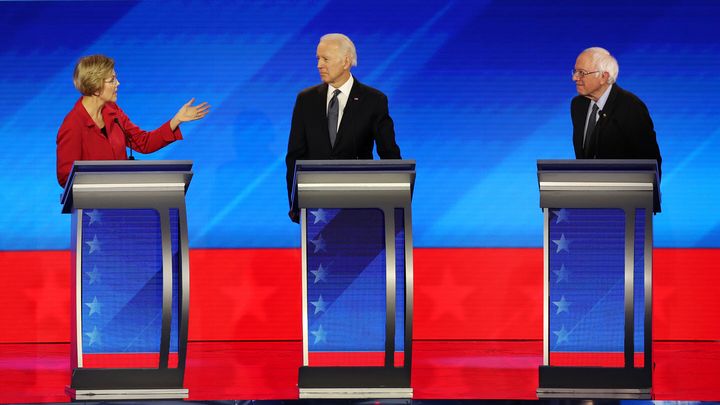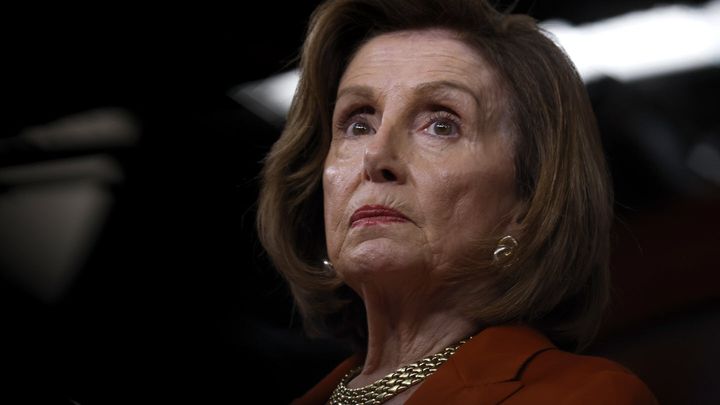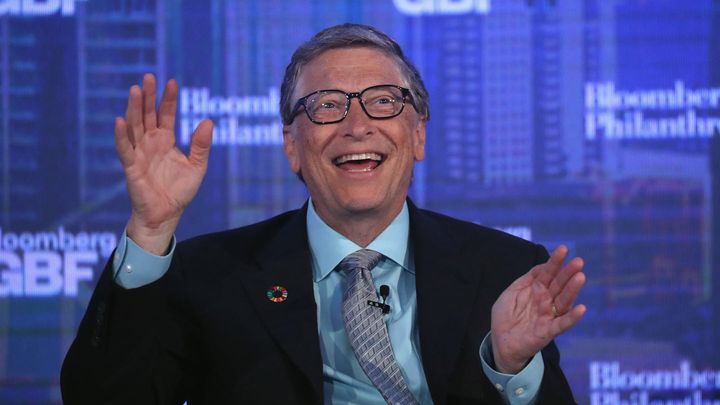Asked whether billionaires should be allowed to spend colossal amounts of their own money in the Democratic presidential primary, Sen. Elizabeth Warren (D-Mass.) said no. In her answer, she wagered that she and Sen. Amy Klobuchar (D-Minn.) were the only two candidates on stage who were running without the support from wealthy super PAC donors.
“I heard everyone here talking about, as Democrats we all want to overturn Citizens United because we want to end this unlimited spending,” she said. “Yeah, except everyone on this stage except Amy and me is either a billionaire or is receiving help from PACs that can do unlimited spending. So if you really want to live where you say, then put your money where your mouth is and say no to the PACs.”
Her Twitter account tweeted out the highlight, implying that by “PACs” she meant “super PACs.” The full text of her answer is here.
While the statement may be technically true, not all super PACs are the same. In fact, there’s a wide chasm between super PACs backing three Democratic candidates, each funded with six-figure donations from wealthy finance executives, and the super PACs backing Sanders, which consist of a nurses union’s PAC and a coalition of progressive organizations that represent over two million working-class people of color.
When evaluating independent expenditures, one must ask the question: is this effort meant to keep power in the hands of billionaires and the corporate elite, or is it meant to bring people who have been historically left out of the political system in?
Natalia Salgado, political director at Center for Popular Democracy Action
“It’s ridiculous to lump groups like Sunrise in with billionaire-funded SuperPACs,” Stephen O’Hanlon, communications director of the youth-led climate group the Sunrise Movement, which is backing Sanders, told Sludge. “Unlike PACs set up by billionaires to blanket the air waves with attack ads, Sunrise and the other groups we’re working with represent working people, young people, and people of color.
“These absurd attacks seem like a sign of desperation, and they’re backfiring,” he continued. “Voters can see right through them, and they are only making our members and people like them—the young people, working-class people, and people of color Warren and Buttigieg need to win—more and more skeptical of their campaigns.”
Briahna Joy Gray, national press secretary for the Sanders campaign, tweeted that Warren’s line was a “misrepresentation” of Sanders’ support.
The Sanders campaign declined to comment for this story. In a Meet the Press interview with Chuck Todd on Feb. 9, Sanders reiterated that he does not want help from outside groups. But he was clear about who makes up these groups. “Some of them are nurses, some of them are immigration activists, and some of them are civil rights activists,” Sanders said. Todd asked if Sanders would accept the help since it’s already out there, and the candidate answered, “It’s legal. What can I do? People have the right to participate in the political process.”
First, let’s take a look at the super PACs backing Joe Biden, Pete Buttigieg, and Andrew Yang. These are the type of well-funded super PACs that Sanders and Warren often rail against: PACs that welcome huge donations from corporate executives to purchase barrages of TV ads that are sometimes difficult for viewers to distinguish from official campaign content.
Biden Super PAC: $6.8 million Spent
The pro-Joe Biden super PAC Unite the Country got the green light from Team Biden in October after underwhelming fundraising in the third quarter of 2019, reversing Biden’s earlier decision to disavow outside support. As Sludge has reported, the super PAC is run by lobbyists, corporate consultants, and Democratic Party fundraisers.
Financing the super PAC are real estate mogul George Marcus, who gave $1 million; Beacon Capital chairman Alan Leventhal ($250,000); investment banking executive Roger Altman ($200,000), BLS Investments chairman and CEO Bernard Schwartz ($100,000), Blair Effron, co-founder and partner of Centerview Partners, the investment banking firm that hired former Chicago mayor and Obama chief of staff Rahm Emanuel last year ($50,000), and Jonathan Gray, president of Blackstone Real Estate ($50,000).
Unite the Country spent over $5.5 million backing Biden in Iowa, where the former vice president appears to have stumbled, placing fourth, although final results have not yet been released. It is also spending money on ads in New Hampshire; according to FEC filings, the PAC has spent close to $1.3 million there as well as $45,000 in Nevada. Unite the Country has spent additional money on fundraising consulting and on focus groups.
Buttigieg Super PAC: $1.7 million Spent
Veterans’ political group VoteVets endorsed Pete Buttigieg, and its super PAC is spending millions to help him win the nomination. According to a recent FEC filing, the VoteVets super PAC has spent $1.7 million so far on TV and digital ads backing the former South Bend, Indiana mayor. VoteVets is a Carey committee, a hybrid arrangement in which a group operates a traditional PAC subject to donation limits, and a super PAC that can accept unlimited cash. The traditional PAC has accepted maximum contributions of $5,000 from the corporate PACs of Cigna, Dell, Fresnius Medicare Care, Edison International, General Dynamics, and Pfizer, as well as from several labor union groups.
The top individual donors to VoteVets’ super PAC in the 2019-20 election cycle are private equity executive Brian Sheth, who gave $100,000, and national security consultant Matthew Jones, who added $50,000.
VoteVets and the Buttigieg campaign have been straining campaign finance laws in the last week. A campaign staffer tweeted what some interpreted as a directive to outside advertisers to hit the Nevada airwaves with messages of Buttigieg’s military service; this is a tactic that some campaigns, barred from coordinating with super PACs, have used to communicate with outside groups.
Then Buttigieg spoke at a New Hampshire event arranged in part by VoteVets Action Fund, an affiliated 501(c)(4) nonprofit. The action fund is openly working with the Buttigieg campaign, but the organization told Sludge that it maintains a staffing firewall between the super PAC and nonprofit.
Yang Super PACs: $540,000 Spent
Two super PACs are supporting California businessman Andrew Yang, and each have combined to spend over half a million dollars to boost his candidacy. Math PAC has spent $358,000 on direct mail and radio, TV, and digital ads nationally and in Iowa and New Hampshire. In 2019, ten donors gave $10,000 or more. Identifying information for many of the donors was omitted, but an individual sharing the name of founder of Siggi’s dairy company gave $55,000. Math PAC says, “We hate super PACs,” but explains that Yang, a political outsider, has a disadvantage and thus needs their support. Without naming them, Math PAC calls out Warren for transferring money from her Senate campaign into her presidential campaign and Sanders for being the “figurehead” of Our Revolution.
The Humanity Forward Fund, another pro-Yang super PAC, has spent $183,000 so far on postcards, online ads, and brochures. Most of the super PAC’s donors in 2019 gave $2,800 or less, but one donor, Virgin Islands-based hedge fund manager, energy trader, and poker player Bill Perkins, contributed $100,000. Another, Texas resident Michael Kenoyer, gave nearly $37,000.
“In an ideal world, SuperPACs wouldn’t exist, but they do,” reads the Humanity Forward Fund’s website. “To level the political playing field, HumanityFWD must exist.”
California hedge fund investor and philanthropist Tom Steyer was on the debate stage last week, too, and is largely self-funding his campaign, like another primary opponent, Michael Bloomberg. Steyer, who is worth $1.6 billion, has spent more than $100 million on television, radio, and online ads since launching his campaign in July.
The Pro-Sanders Groups
It’s unclear which pro-Sanders organizations Warren was referring to when she said that only she and Klobuchar were running without super PAC support—the Warren campaign did not respond to Sludge’s requests for comment. Some, including myself, assumed she was referring to the super PAC of National Nurses Union, a California-based union. Others thought she meant Our Revolution, which is a 501(c)(4) nonprofit, not a super PAC. Still more theorized that she may have been referring to nine supporting organizations, mostly small operations representing young and working-class people and people of color. Perhaps, she meant all of these groups.
National Nurses United
The California-based nurses’ union National Nurses United endorsed Sanders and reported spending roughly $70,000 in late 2019 on placards and t-shirts through its affiliated super PAC. The group has not reported making any independent expenditures so far this year. Unlike traditional super PACs, the union’s PAC is funded mostly with member dues from the union itself. It also received $14,700 from Reclaim Chicago PAC, a progressive group that spends money on Illinois state elections and has endorsed Sanders.
The nurses’ union backed Sanders in the 2016 presidential primary as well, and a February 2016 article quotes National Nurses United Director RoseAnn DeMoro as saying, “It’s not a super PAC. It basically lacks the appropriate definition at the FEC.” She told Time that her group was fully funded by its members. “We don’t take outside money from anyone,” she said.
On Jan. 30, nine progressive groups announced a collaboration called People Power for Bernie. The groups, which include the Sunrise Movement, racial justice organization Dream Defenders, and immigrant rights group Make the Road Action, are combining forces to knock on doors, text and call potential voters, and organize on college campuses and online to help get out the vote. The groups, which “represent a total of 2.2 million primarily Black, Brown and working people and young people,” according to a press release, hope to mobilize 1.4 million voters in early-voting states, swing states, and large Super Tuesday states.
Here are these groups, some of which formed super PACs in order to spend directly on politics.
Sunrise Movement
“We realized in 2018 that because of the way our election laws work, forbidding traditional nonprofits from engaging in elections, that doing any work in support of politicians and political candidates meant we would need a PAC of our own,” said O’Hanlon. “We have it so that passionate young people can get involved to help elect Green New Deal champions across the country, and fight back against the millions of dollars in PAC money flowing to politicians from the oil industry and right wing billionaires to block climate action.”
Sunrise PAC is a traditional PAC that can also make independent expenditures. Formed in March 2018, it has no full-time staff. The PAC has received most of its funding, $400,000, from the Sunrise movement, which is a 501(c)(4) youth-led group that works to promote the urgency of addressing climate change. An additional $86,000 has come from individual donations, most of which were under $1,000. The PAC had reported making $49,000 worth of independent expenditures benefiting Sanders as of the date of publication. Unlike traditional super PACs, which typically log ad production and placements costs, Sunrise’s IE reports detail meals, lodging, gas, staff time, as well as some small Facebook ad purchases.

O’Hanlon contrasted the Sunrise PAC spending with that of more traditional super PACs.
“None of that money went to slick TV ad makers, and none of it came from secretive right-wing billionaires, unlike the enormous amounts of cash pushed into Super PAC’s on behalf of corrupt, fossil fuel-funded politicians,” he said. “Our grassroots-funded and entirely youth-run operation just exists to help young people knock on doors, make calls, distribute Green New Deal campaign literature, and send texts to boost our candidates nationwide who will fight for our generation.”
Dream Defenders
The Florida-based Dream Defenders is a racial justice group formed in 2012 after the death of Trayvon Martin, an unarmed black teenager who was racially profiled and killed by George Zimmerman. One of the co-founders, Philip Agnew, is a Sanders campaign surrogate and spoke at rallies in Iowa before last week’s caucuses.
The group launched its super PAC, Dream Defenders Fight, in late November 2019. It has spent roughly $22,000 on independent expenditures, mostly backing Sanders. Of the $60,000 it has raised, $25,000 came from the Movement Voter Project, a group that helps donors support “the best and most promising LOCAL community-based organizations in key states with a focus on youth and communities of color,” $22,500 came from the Indivisible Project, a group founded “to resist the Trump agenda,” and $10,000 came from progressive philanthropist Rachel Gelman.
Nailah Summers, communications director of the Dream Defenders, told Sludge about the group’s super PAC’s organizing efforts.
“We’re knocking doors, phone banking, throwing events in communities all over Florida,” she said. “One of our organizers is from Sanford, Florida and he’s putting together a basketball tournament called ‘Ballin’ for Bernie’ there. We’re throwing events on campuses at HBCUs and most of the major colleges in Florida. We’re sending a bus of our members to canvass for Bernie in South Carolina ahead of their primary.”
In contrast to traditional super PACs funded by corporate executives, Summers said, Dream Defenders is “an organization of young, working-class Black and Brown people learning to use the political tools that have been available to these entities that have unlimited resources for at least a decade. We’re not in Washington, we aren’t career campaigners, no one over here interned for the DNC or anything. We’re a bunch of young people in the South directly impacted by the games these politicians and their camps play.
“We are an organization made up of young, working-class people of color,” Summers continued. “Our organization is run by young black women. We are immigrants and people affected by the criminal justice system. Many of us don’t have insurance. We’ve got queer, gender-non-conforming and trans members. We’ve got members taking care of their aging family members. We’ve got people in our organization working 2 and 3 jobs. We live in superfund sites. We’re pretty much all drowning in student debt. Our lives are deeply, deeply affected by who wins this election. We are fighting for our safety, for our livelihoods, for the families we represent. We are keenly aware of what the stakes are in this election. So no, it isn’t fair to lump us in with the likes of Wall Street or billionaires who want to maintain the status quo. It’s because of the status quo that we’re in this mess and we have a vested interest in dismantling it.”
This is the first time that Dream Defenders has endorsed a presidential candidate.
Center for Popular Democracy Action
Center for Popular Democracy Action, the 501(c)(4) nonprofit arm of the progressive organizing group Center for Popular Democracy, formed its Popular Democracy PAC last month so it could make independent expenditures in the presidential race. The Center for Popular Democracy “works to create equity, opportunity and a dynamic democracy,” according to its website.
The PAC has spent $19,500 so far on canvassing for Sanders. Because it was so recently formed, it hasn’t reported the names of its donors, but the group told Sludge that it is raising money from small donations, other individual contributions, and other organizations.
“There is a dangerous false equivalency that equates Super PACs that corporations and billionaires set up to ensure that the political deck continues to be stacked in their favor, and efforts like ours,” Natalia Salgado, political director at Center for Popular Democracy Action, told Sludge. “When evaluating independent expenditures, one must ask the question: is this effort meant to keep power in the hands of billionaires and the corporate elite, or is it meant to bring people who have been historically left out of the political system in? When you look at efforts backing Biden and Buttigieg, you see Wall Street bankers, you see the credit card industry, you see billionaires who are willing to wade into politics if it means that it will help them to keep their billions and their power.
“We are sick of the stranglehold that millionaires, billionaires and big corporations have on our economy and our democracy,” said Salgado. “We’re flooding the streets with real people—Black and Brown people and communities affected by the harmful impacts of the current administration. It takes money to mobilize our communities, and that’s why we’re raising and spending money through the structures set up and called Super PACs.”
People’s Action
Membership-based 501(c)(4) nonprofit People’s Action is a “national network of state & local grassroots power-building organizations” representing 1.3 million members that fights for a clean environment, health care for all, housing justice, and free college, according to its website. It has spent $13,500 on canvassing, phone banking, literature, and staff time backing Sanders. It is in the process of creating a hybrid PAC/Super PAC that can devote all of its resources to electoral politics. The group is reallocating $100,000 that it raised before endorsing Sanders to its independent expenditure effort, and it has also raised a few thousand dollars in small donations specifically for the effort.
“Our members in the multiracial working class will not be told to sit on the sidelines when white supremacy, corporate power, and the climate crisis are all reaching a boiling point,” Derrick Crowe, communications and digital director of People’s Action, told Sludge. “We are spending no funds on TV ads. Ninety percent of our money goes to salaries for organizers who mobilize volunteers to talk with voters, especially Black, Latinx, and API voters within the multi-racial working class.
“We reject any comparison between us and corporate front groups funneling cash from corporate interests to prop up their political puppets,” said Crowe, who also noted that People’s Action appreciated that Warren engaged with its membership and sought its endorsement last year. “While our members endorsed Senator Sanders as the best choice to win the presidency and win on our issues, Senator Warren was our second choice, and we look forward to working together with her in the future,” Crowe said.
Our Revolution
501(c)(4) nonprofit Our Revolution, which was formed in the wake of the 2016 election by Sanders campaign officials and surrogates, is organizing phone banking, canvassing, and other volunteer efforts to boost Sanders’ campaign. The group is not a super PAC, as a poorly worded Associated Press headline has led some social media users to believe.
Local Our Revolution branches are supporting Sanders by “mobilizing their members to vote in primaries,” Paco Fabián, director of communications and campaigns at Our Revolution, told Sludge. The group will not use “ads, flyers, or paid phone bankers or canvassers,” he said. “Our total base of support is several million people, and they do not need persuasion, as our members overwhelmingly support Bernie. Our strategy is to make sure folks turn out.”
Fabián said that all Our Revolution donors are individuals. The largest donation in 2019 was $25,000, and several individuals gave $5,000 each, but the average contribution that year was less than $18, he said. The group lists every donor who gave more than $250 on its website.
“We think it is dangerous to equate corporations and billionaires pooling their money to buy elections to grassroots groups such as ourselves, Sunrise, Center for Popular Democracy, People’s Action, composed of people like us—Black, Brown, young, and working people who believe that together, we can make a difference in this country through organizing,” said Fabián.
Our Revolution has come under scrutiny for spending money benefiting Sanders’ campaign because a federal law prohibits groups formed by a candidate to spend money to support that candidate. Good-government group Common Cause filed a complaint with the FEC in January.
Fabián disputes Common Cause’s complaint as “gotcha games,” saying that Sanders “recused and removed himself within weeks of the Our Revolution launch. Larry Cohen recruited the Board without consultation with Sanders and the Board hires the Executive Director, currently Joseph Geevarghese. Sanders has no ongoing policy or managerial role within Our Revolution.”
The other member groups of the People Power for Bernie coalition are Democratic Socialists of America, Make the Road Action, Progressive Democrats of America, and Student Action, a branch of People’s Action.
Warren’s Outside Support
Warren was one of the first Democratic candidates to swear off support from super PACs. Multiple political groups are supporting her candidacy, but they do not plan to make independent expenditures on her behalf.
“We are not making any independent expenditure for Warren,” said Joe Dinkin, campaigns director of the Working Families Party, which endorsed Warren in September 2019. “We’re coordinated and WFP volunteers are getting involved directly with the campaign. Meanwhile, WFP leaders like Maurice Mitchell have crisscrossed the country speaking to crowds and to media on the campaign’s behalf.”
The Working Families Party does have an affiliated super PAC but will not use it to back Warren. Instead, Working Families Party volunteers support the campaign, and the campaign covers any necessary travel costs. The party has helped in other ways as well, including recommending staff for the campaign to hire.
The Progressive Change Campaign Committee, a federal PAC subject to traditional donation limits that has endorsed Warren, is not making any independent expenditures in the presidential race. “We help Warren’s bid for the nomination by providing opportunities for our nearly-million members to engage in the Warren campaign via email and social media,” Press Secretary Maria Lanholz told Sludge. “And we speak publicly about the campaign and progressive issues.”
Warren and Sanders both eschew big-dollar fundraisers that give wealthy donors special access to candidates. Although Warren has held such events in past elections, she has stuck to her pledge this time around. She has come under scrutiny for, like some other candidates, accepting help from a Democratic megadonor to pay for the expensive Democratic National Committee voter database.
Klobuchar does not appear to have super PAC backing, but she sought donations from a former Goldman Sachs banker, hosted big-money fundraisers, has over 150 “bundlers” who raise at least $25,000 in individual donations for the campaign, and has accepted donations from at least 21 billionaires, according to Forbes.
Read more from Sludge:



